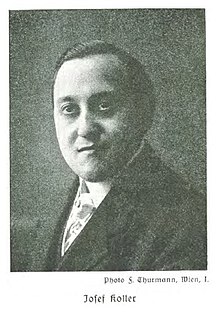Josef Koller
Josef Koller (born August 18, 1872 in Vienna , † October 15, 1945 in London ) was a Viennese folk singer , comedian, actor, writer and folk song researcher.
Life
Josef Koller, the son of a businessman, made his debut at the age of 18 as an actor at the Sulkowsky Theater in Matzleinsdorf , at the time a suburb of Vienna , after completing his commercial training .
He performed in Teplitz, Prague and Budapest and made guest tours through Italy, Germany and Austria before joining the Budapest Orpheum Society in 1897 . Together with his wife, the Viennese lieder singer, soubrette and dancer Paula Walden , he was one of the most popular members of this establishment for many years as the Viennese joke-singing duet Koller-Walden . One of his successful roles there was the waiter Moritz in the Klabrias part . The Duo Koller-Walden also performed on other stages with their singing and dance duets. For these vaudeville appearances and private engagements they had a "decent, rich program, mostly original couplets: two different numbers every evening: a duet, a soli". Until 1914, Koller and his wife were members of the Orpheum Society in Budapest.
In 1916 Koller acquired the production license for folk singer leaders from the Imperial and Royal Lower Austrian Lieutenancy . This enabled him to run his own events and open his own variety theater, which he did a few years later, namely the Cercle des Etrangers establishment on Schwarzenbergplatz in Vienna. After he was granted the “production license for telepathy waking suggestion, excluding hypnosis”, in 1919 Koller organized performances by the telepath Erich Jan Hanussen at secondary schools and higher education institutions in Mährisch Ostrau. This was followed by "humorous lectures by Director J. Koller."
Josef Koller founded the international artist club Die Lustigen Ritter in Vienna with Matthias Bernhard Lautzky, Max Rott , Josef Modl and Karl Kratzl in 1892 , which supported impoverished artists, and was also its artistic director. In 1900 members of the International Artist Club bought a house in Gablitz, Linzerstraße 78, which was owned by Josef Koller from 1917 to 1932. During this time he was also active in Lower Austria. He was later also the leader and spokesman for the authors' association. He is also considered the founder of the Austrian actors' association.
Koller wrote comedies, rascals, operettas and antics. His plays have also been performed on German-speaking theaters in America. The posse Auf der Polizei has been played over 1,000 times. As the author of the book Das Wiener Volkssängertum in old and new times , he wrote a unique document of the history of Vienna.
After Austria was annexed to Hitler's Germany, Koller emigrated with his wife Sophie Koller, b. Kornspann, to London. There he worked on a new work until his death, a history of Viennese theater, which he almost completed. Josef Koller died of a stroke in London on October 15, 1945.
Works
- From the depths of the big city , Schwank
- On the police (1907), Schwank (with E. Weinhauser)
- Flower Awakening (1909), Fantastic Joke (with W. Plautus)
- A Failed Misstep (1906), Posse
- In the boudoir , Schwank
- Night pictures - from the depths of the big city (1908), Posse (with W. Plautus)
- Latest anecdotes, humoristic, solo and duo scenes (Verlag G. Szelinski & Co)
- Pankraz Podlaka as a hall guard solo lecture in the Bohemian-German dialect
- Wiener Mädeln (1911), operetta (with Leo Einöhrl ), music: Ernst Wolf; Premiere in Venice in Vienna
Fonts
- Viennese folk singing in old and new times. Gerlach & Wiedling, Vienna 1931.
literature
- Pemmer: Koller Josef. In: Austrian Biographical Lexicon 1815–1950 (ÖBL). Volume 4, Verlag der Österreichischen Akademie der Wissenschaften, Vienna 1969, p. 88.
- Wiener Stadt und Landesbibliothek Manuscript collection: Josef Koller's estate
- Wiener Stadt und Landesbibliothek Manuscript collection: Hans Moser's estate
Web links
- Literature by and about Josef Koller in the catalog of the German National Library
Individual evidence
- ^ Georg Wacks: The Budapest Orpheum Society. A vaudeville theater in Vienna 1889–1919. Foreword by Gerhard Bronner . Holzhausen, Vienna 2002, ISBN 3-85493-054-2 .
- ↑ Programs and official letters in the Josef Koller estate, Wiener Stadt und Landesbibliothek Manuscript collection: Confirmation from the mayor of Bielitz on April 25, 1919.
- ↑ District Court Purkersdorf (ed.): Land Registry Gablitz . EZ 54.
- ↑ Werner Mittenzwei, Henning Rischbieter, Hansjörg Schneider, Frithjof Trapp (eds.): Handbook of the German-speaking Exile Theater 1933–1945. 3 volumes. Munich 1999, ISBN 3-598-11373-0 .
- ↑ Reinhard Müller (Ed.): Vanishing Point England: Traces of Austrian Emigration in Great Britain 1938–1945. Catalog for the exhibition at the University Library Graz, Graz 1996, pp. 29–63.
- ^ KK: Obituary for Josef Koller . In: Zeitspiegel. Exile newspaper of the Austrian Center in London 1941–1946, No. 43, October 27, 1945.
- ↑ Certified Copy of an Entry of Death. General Register Office, St. Marylebone District, London. Application Number: W005727; DXZ 671956.
- ^ Vienna City and State Library, manuscript collection, Josef Koller's estate: Contract between the music publisher "Hölle", L. & S. Natzler, Musikverlag, Bühnenverlag and Distribution, Vienna VI., Magdalenenstrasse No. 8 and Messrs. Josef Koller, Ernst Wolf and Leo Einöhrl on the operetta 'Wiener Mädeln' in one act by Koller / Einöhr / Wolf for the Venice Operetta Theater in Vienna for the summer of 1911. Royalty: 500 crowns. (March 2, 1911)
| personal data | |
|---|---|
| SURNAME | Koller, Josef |
| BRIEF DESCRIPTION | Austrian folk singer, comedian, actor, writer and folk song researcher |
| DATE OF BIRTH | August 18, 1872 |
| PLACE OF BIRTH | Vienna |
| DATE OF DEATH | October 15, 1945 |
| Place of death | London |
